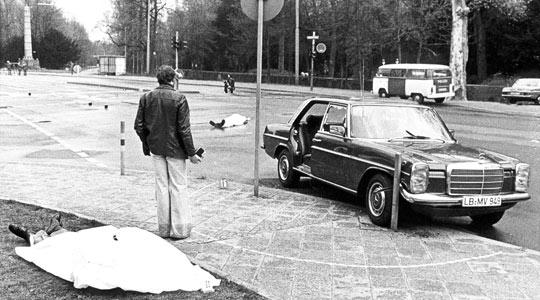(Note: This week’s blog gives you a choice—please pick from one of the two prompts below, and as always, keep it short and informal! Engagement and conversation above all!)
Look again at your index cards. Flip back and forth between its two sides. Continue the incredible discussion that we started in class: What distinguishes civil wars from revolutions? If both phenomena have the capacity to produce transformations of polities and societies, why bother with separate terms, other than the assumption that one is somehow “better” than the other?

“…No. 1 is all for potash; therefore B. and the thirty had to be liquidated as saboteurs. In a nationally centralized agriculture the alternative of nitrate of potash is of enormous importance: it can decide the issue of the next war. If N. 1 was in the right, history will absolve him, and the execution of the thirty-one men will be a mere bagatelle. If he was wrong…
…But how can the present decide what will be judged truth in the future? We are doing the work of prophets without their gift. We replaced vision by logical deduction; but although we all started from the same point of departure, we came to divergent results. Proof disproved proof and finally we had to recur to faith—to axiomatic faith in the rightness of one’s own reasoning.”
We’ve encountered a rather grim picture these past few weeks of where “good ideas” might carry movements and struggles for freedom, whether it be the self-abnegation of Rubashov or the veritable orgy of violence and decadence of the Baader Meinhof gang. Whereas Gramsci and Stuart Hall demand the inclusion of the intellectual in movement politics, and Mary Kay Vaughan demonstrates that even poorly educated rural school teachers can serve as “organic” mediators between an emerging state and members of society, a wide variety of authors, from Fanon to Havel and Miłosz, or most recently (and acutely), Mao, regard intellectuals as obstacles to change, even, in the case of Mao, counter-revolutionary. Consider how revolutions might be tied to intellectual leadership, to the totalizing visions of a vanguard. Must movements be rooted in a coherent set of ideas and values to be successful? Gudrun Ensslin at one point tells Ulrike Meinhof that they must adopt a “new morality.” What happens when this new morality encounters success, specifically, the formation of the state? What happens when the inevitable divergencies from the glorious path begin to occur…?

One thing I’ve been wondering since the last class is whether the term Civil War has the same negative connotation abroad as from an American perspective. I think within the United States there is a normative bias towards a positive view of revolution and a negative view of civil war given the historical context. If civil war has become a normatively negative term globally when did this shift occur? I think its also interesting to consider the point in which a revolution becomes a civil war. The Syrian case many may argue began as a revolution, but since then has been labeled a civil war. Has this changed the incentives for involvement by the international community given the differing implications of the two labels? I also wonder to what degree revolution can exist outside of the context of civil war if we define it as extra-constitutional. Do peaceful revolutions truly circumvent the established norms and institutions within society? While peaceful revolutions do result in large collective action and encourage change within society, do they truly circumvent or drastically change the previously existing institutions enough to constitute a revolution?
I think that the question that should be asked on the issue of the intellectual in revolution rather than must movements be rooted in a coherent set of ideas and values is, can anyone (i.e. the subaltern) create that coherent set of ethos?
I think the gangs of horny, sociopathic, seemingly immature gangs we see in Baader Meinhof are a perfect example of the fact that a revolution, a successful one at least, must be rooted in coherent values. In the end of Baader Meinhof the new era of “revolutionaries” are disconnected with the leaders and the group seems to be more of a nihilistic terrorism rather than a revolution, shown in the ending scenes. We’ve talked about the revolution being revolved around consolidating a movement through tactics of participation. However, it is not just the crowd that facilitates a successful revolution, but rather the uniting mission, the strengthening initiative that forms the crowd in the first place. However, as we’ve read, the issue is not wether or not these movements need a set of ethos but rather who has the skill set, the ability to create this mission? For Gramsci, he made (in my opinion) the elitist assumption that the masses needed the intellectual. Whereas minds like Fanon or MKV suggest that the intellectual is not an asset to the consolidation of revolutions. For instance Fanon claims that the intellectual is only fully educated once he’s taken a walk amongst the people and learned from them.
All in all I think that it’s dangerous to generalize that each revolution needs the same recipe to be successful as each context has different circumstances. However, in my mind, violence complicates revolution in making the uprising a zero-sum game, as we will learn reading Erica Chenoweth. In these circumstances, I think the risk is higher and thus the need for strategic tactics is heightened. In a community such as Haiti, where the slave community was steeped in battle not theory, the intellectual (in the form of the free colored individuals), was needed to form a sovereign nation. However, in a context of MKV’s argument, the masses had the “organic” mediation of the school teachers to provide the role of the intellectual. The intellectual is needed as there will always be a need for a totalizing vision, however, where that intellectual takes form depends on the context of the movement.